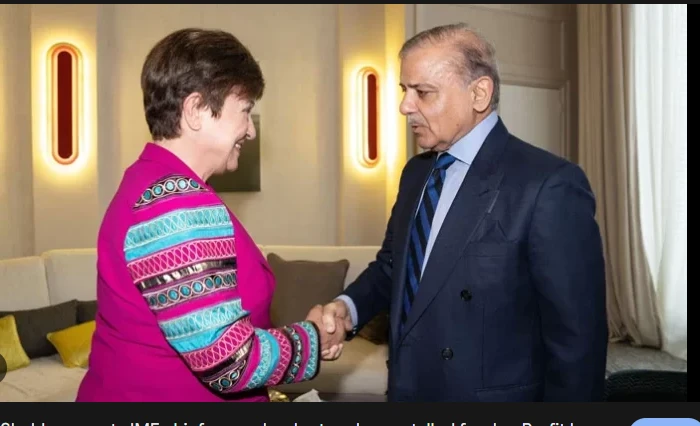IMF’s approval of $1.1b tranche to bring economic stability: PM Shehbaz

Stay tuned with 24 News HD Android App

Prime Minister Shehbaz Sharif has said that the International Monetary Fund’s (IMF) approval of $1.1 billion in funding for Pakistan would bring economic stability, amid discussions for a new bailout loan, reported 24NewsHD TV channel.
The funding is the second and last tranche of a $3 billion standby arrangement with the IMF, which Islamabad had secured last summer to help avert a sovereign default. The approval came a day after Shehbaz Sharif discussed a new loan programme with IMF Managing Director Kristalina Georgieva on the sidelines of the World Economic Forum in Riyadh.
According to a statement issued by the Prime Minister’s Office (PMO) in Islamabad on Tuesday, Shehbaz Sharif expressed his satisfaction over the release of the last financial tranche of the IMF loan. “Receiving the last tranche of 1.1 billion dollars from the IMF will bring more economic stability in Pakistan,” he remarked.
While talking about the reforms undertaken as per the IMF programme, the prime minster said “Bitter and difficult decisions were taken for the economic security of Pakistan, but their fruits are coming in the form of economic stability.”
Islamabad is now seeking a new, larger long-term Extended Fund Facility (EFF) agreement with the IMF after the current standby arrangement expired this month, and continuing with necessary policy reforms to rein in deficits, build up reserves and manage soaring debt servicing.
In his statement, Shehbaz Sharif reflecting on the significance of this milestone, recalled the completion of the IMF programme during the tenure of Nawaz Sharif in 2016. He emphasized that this second programme's completion marked a crucial step for the nation.
Attributing the agreement's importance, he acknowledged its role in steering Pakistan away from default during the previous government's 16-month tenure, and he also noted that these decisions are now yielding positive outcomes in the form of economic stability.
With a determined spirit, Shehbaz Sharif affirmed his commitment to harnessing this opportunity granted by providence to propel economic development in the country.
Highlighting his vision of success, the PM stressed that true success lies in liberating the nation from the shackles of debt, rather than merely acquiring loans.
Looking ahead optimistically, he expressed confidence that by steadfastly following the right path, Pakistan will soon witness an era of debt relief and economic prosperity.
Commending the efforts of the economic team, including Finance Minister Muhammad Aurangzeb, Shehbaz Sharif credited their dedication in achieving this milestone.
Expressing gratitude towards the IMF Managing Director for supporting Pakistan during challenging times, the premier underscored the importance of international cooperation.
Earlier on Monday, the IMF Executive Board's decision to release the final tranche of approximately $1.1 billion to Pakistan has been met with approval, bringing the total disbursements under the Stand-By Arrangement (SBA) to about $3 billion.
During their meeting in Washington, the board unanimously favoured releasing the last instalment, except for India, which abstained from the decision.
In a statement, the IMF recognized Pakistan's stronger policy efforts under the SBA, which have contributed to stabilizing the economy and ushering in modest growth. However, the IMF underscored the need for Pakistan to transition from stabilization to a robust and sustainable recovery, emphasizing the importance of continued policy and reform efforts.
The Fund reminded Pakistan to safeguard vulnerable sections of society from the potential impacts of these reforms, while also advocating for a market-determined exchange rate and broader structural reforms to support inclusive growth.
Deputy Managing Director Antoinette Sayeh emphasized Pakistan's progress in restoring economic stability through determined policy efforts but urged continued fiscal discipline and structural reforms to foster stronger, inclusive, and sustainable growth.
Reporter Awais Kiyani
